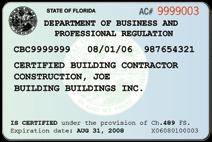Some Helpful Tips:
>> Review your contract before you sign it.
>> Contact your insurance company to make sure work performed is covered under insurance policy.
>> Avoid paying cash.
>> Avoid any contractor who requires full payment in advance. Arrange to pay after the contractor completes the work or in agreed-upon installments.
>> Don’t sign off that work is completed until all work is finished according to your contract, and the contractor has cleared all permits with final inspection approval from the building department.
>> If your contract exceeds $2,500, become familiar with the Florida Construction Lien Law. See the link below.
>> Most jobs require permits. Always check with your local building department regarding permits needed for your project.
To verify a contractor’s license, or to file a complaint against a contractor, call 1.850.487.1395 or go to the Department’s website: www.MyFloridaLicense.com
For information about the Florida Construction Lien Law: http://www.leg.state.fl.us/statutes/index.cfm?App_mode=Display_ Statute&Search_String=&URL=Ch0713/PART01.HTM
Report Unlicensed Activity Toll-Free at: 1.866.532.1440
Additional information: www.BobVila.com/MyFloridaLicense/
For answers to other questions or for assistance following a disaster or emergency, contact the following:
American Red Cross:
1.800.HELP.NOW (1.800.435.7669)
Attorney General’s Price Gouging Hotline:
1.800.646.0444
Department of Agriculture and Consumer Services
Consumer Tips for Natural Disasters
1-800-HELP-FLA (1.800.435.7352)
Department of Elder Affairs:
1.800.96.ELDER (1.800.963.5337)
Department of Financial Services
Insurance Claim Hotline:
1.800.22.STORM (1.800.227.8676)
The Florida Bar (Lawyer Referral Service): 1.800.342.8011
Florida Emergency Information Line 24-hour Hotline (FEIL): 1.800.342.3557 (This number is only operational during an emergency event.)
The rush to hire a contractor may lead you to hire a dishonest individual…
or to hire an unlicensed contractor.
While hiring an unlicensed contractor may provide a quick fix in the short term, it could result in many serious and lasting consequences, including further damage to your property.
By hiring a licensed contractor, you will have peace of mind knowing that the project will be done by someone who has taken the time to acquire the appropriate education and the proper workers’ compensation and/or liability insurance and who possesses the necessary experience.
It is extremely important to be cautious when contracting for home improvements and storm repairs. Educate yourself, become an informed consumer, and protect yourself from dishonest persons who will use your misfortune to their advantage.
>> Unlicensed contractors often target the uninformed and inexperienced, as well as the elderly.
>> They solicit door-to-door, frequently traveling in unmarked trucks and vans.
>> They give a post office box address instead of a street address.
>> They convince you to obtain the necessary building permits.
Choosing a Contractor
>> Before you hire a contractor, ask to see a state-issued license.
Be sure the license looks like the example to the right. Ask to see multiple forms of identification.
An occupational license does not qualify an individual to act as a contractor.
Ask for references. A legitimate contractor will be happy to provide you with the names and contact information of recent customers.
Get a written estimate from several licensed contractors. Make sure the estimate includes the work the contractor will do, the materials involved, the completion date, and total cost.
Beware of contractors who claim to be the fastest or the cheapest. Hiring them could result in poor workmanship, inferior materials or unfinished jobs.
>> Contact your insurance agent first to verify your insurance covers the repairs before you sign a contract. Know the steps to file a claim. You do not have to tell the contractor how much your insurance company will pay for repairs, but if you do, get the contractor’s estimate first.
>> A contractor must have a license from DBPR to perform roofing repairs or replacements, structural additions, air conditioning repair or replacement, plumbing work, electrical and/or alarm work. These jobs typically require a permit. Be sure to check with your local building department regarding permit requirements for all of your projects.
DBPR does not license or have jurisdiction over concrete contractors, painters, drywall contractors, cabinetmakers, tile installers, or anyone doing minor repairs. Check with your local building department regarding licensure requirements for these trades. Remember to ask for references.
Signing a Contract Be certain
your contract includes:
The contractor’s name, street address, telephone number and state license number.
A precise description of work to be completed, including a work completion time line (draw schedule) and list of materials.
Completion date, including cleanup after the work is finished.
Warranty agreements, including length, terms and recourse.
A notice of consumers’ rights under the Florida Homeowners’ Construction Recovery Fund for contracts involving general, residential and building contractors.
>> Read your contract carefully and personally fill in any blank spaces. Consider having an attorney review the contract. If you do not have an attorney, the Florida Bar offers a lawyer referral service.









